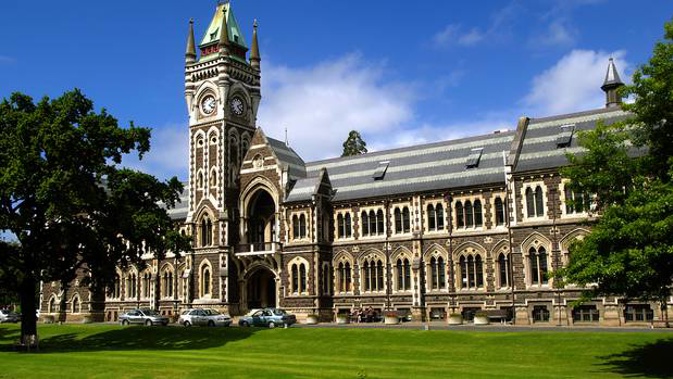
A group of Otago University scientists are mounting an eleventh-hour bid to avoid proposed job cuts they say would have national implications for research on natural hazards and climate change.
The proposals – which the university has asked feedback on by noon today – would result in the loss of two academic roles and several technical staff positions in the geology department, with some long-serving academics having already opted to take voluntary redundancy.
Amid a wider funding crisis facing New Zealand’s universities, Otago has been under pressure to cut costs and in April announced plans to cut hundreds of jobs across its faculties.
While a one-off $21m boost from the Government for the next two years would ease some of the strain on its finances, the university still faced a deficit and was pushing ahead with some proposed cuts.
Otago’s Pro-Vice Chancellor of Sciences, Professor Richard Barker, said the geology department had experienced “significant declining enrolments” over the past decade.
“With a consequential drop in income, the department has become reliant on a large subsidy from the university to allow it to operate, a situation that is unsustainable.”
Last month, a proposed restructure set out how the department was projected to make a $1.7m bottom-line loss, and it was anticipated the cuts would directly save about $900,000.
Among the staff who’d already left or retired were renowned palaeontologists Professor Ewan Fordyce and Associate Professor Daphne Lee, and structural geology specialist Associate Professor Stephen Smith.
Now, there were worries that the proposals would be another major blow.
“Our professional staff have highly specialised skills and this will leave students and staff alike without adequate support to perform their research,” said Jack Beagley, a PhD student in the department.
“Uniquely, our professional staff are often co-authors on our publications, so there will be a very direct impact through the loss of their academic contribution.”
Beagley said the department was already understaffed, and there were frequent cases of academic staff and postgraduate students taking time away from their own research to partially fill the gap of lab managers.
“We expect this to become prevalent across the department if the proposal is followed through,” he said.
“This directly impacts the time and resources that staff have available for research so will necessarily impact the quality and quantity of research.”
He also feared the cuts would lead to students taking longer to complete their programmes, while having supervisors with less time to mentor them, and fewer staff to teach them skills.
“Staff who do remain will be worked harder as we are expected to maintain our current standard of teaching and research.”
Proposed job cuts across Otago University drew a major protest earlier this year. Photo / Otago Daily Times
More widely, he said the impact would be felt right across the country’s geoscience community.
“Our department is highly collaborative – both internally and externally – so there will also be repercussions for other institutions that currently interact with and rely on our academic and professional staff,” he said.
“With the work required to prepare our nation for more extreme weather events, and to heal from past events, we need to be as prepared as possible and this requires geology and geoscience graduates who understand the land around us.”
He listed off some of the major projects that could be affected, including a Fiordland-focused project seeking to protect one of New Zealand’s largest carbon sinks, research into Auckland’s volcanic field, and work on glacial stability in Antarctica.
“I think that the state of a country’s geoscience field is a symbol for how prepared and concerned a country is, [for and of] natural hazards and climate change,” he said.
“This proposal, and others that have occurred at universities in New Zealand send a signal that natural hazards and climate change are not important to the central government and the university administrations.”
It’s also drawn alarm from the New Zealand Association of Scientists (NZAS), as well as the Geoscience Society of New Zealand, whose president Dr Katherine Holt worried Otago’s decisions were being made through a “short term, reactionary lens”.
“We are currently coordinating a nationwide plan to bring more students into geoscience, but it is not an overnight fix,” Holt said.
“Nevertheless, we expect to see a rebound in geology student numbers in the coming years. Cutting capacity in teaching and research at Otago now for short-term cost savings may well have long-term consequences.”
NZAS co-president Professor Troy Baisden said the proposal lacked “clarity” about how research funding or success was important, amid other concerns he felt should change or delay the plans.
“Changes may have to be made but greater care should be taken – the future of our responses to climate change, hazards and the resource-environment tradeoff in our vast domains of New Zealand’s ocean estate hang in the balance.”
Those points were echoed by Professor Rob McKay, director of the Antarctic Research Centre at Victoria University, which recently proposed its own geosciences shake-up.
“Geology and earth sciences have never been a more relevant higher education investment for New Zealand,” McKay said.
“Although traditionally seen as supporting extractive industries like mining and petroleum, with graduates working offshore for international companies - the modern graduates in these fields are now helping to solve many of New Zealand’s biggest problems.”
Beagley said the department was working toward a counter-proposal that would meet financial goals without needing job losses, while its post-graduate students had drafted a 54-page submission of their own.
Barker acknowledged the process would be difficult for affected staff, who were being supported through it.
“We are currently still working through the consultation [and] feedback process.”
While he said the proposal would have an impact on staff numbers, he contended it wouldn’t affect the current curriculum or students.
“The changes proposed are designed to preserve our core strength in geology while also addressing an urgent financial imperative for the university.”
Take your Radio, Podcasts and Music with you

/cloudfront-ap-southeast-2.images.arcpublishing.com/nzme/K5HY6A5FZJFFJBFIBZCR2OT4I4.JPG)








